Leadership and Management in Operations at Mark and Spencer Report
VerifiedAdded on 2020/06/04
|10
|3802
|48
Report
AI Summary
This report examines the critical roles of leaders and managers within the context of Mark and Spencer's operations management. It begins by defining and comparing the characteristics of leaders and managers, highlighting their distinct responsibilities in achieving business objectives, including setting goals, motivating staff, and implementing strategies. The report then analyzes how these roles apply in different operational situations, such as planning, organizing, directing, staffing, and controlling, within the retail environment. Furthermore, it explores various leadership theories and models, like contemporary, classical, behavioural, and contingency theories, and how these can be applied to improve operational efficiency and product quality. Key approaches to operations management, including Six Sigma, Just-in-Time, and lean production, are explained, along with the impact of the business environment on operational management. The report emphasizes the importance of operations management in achieving business objectives and assesses the factors within the business environment that influence operational strategies.
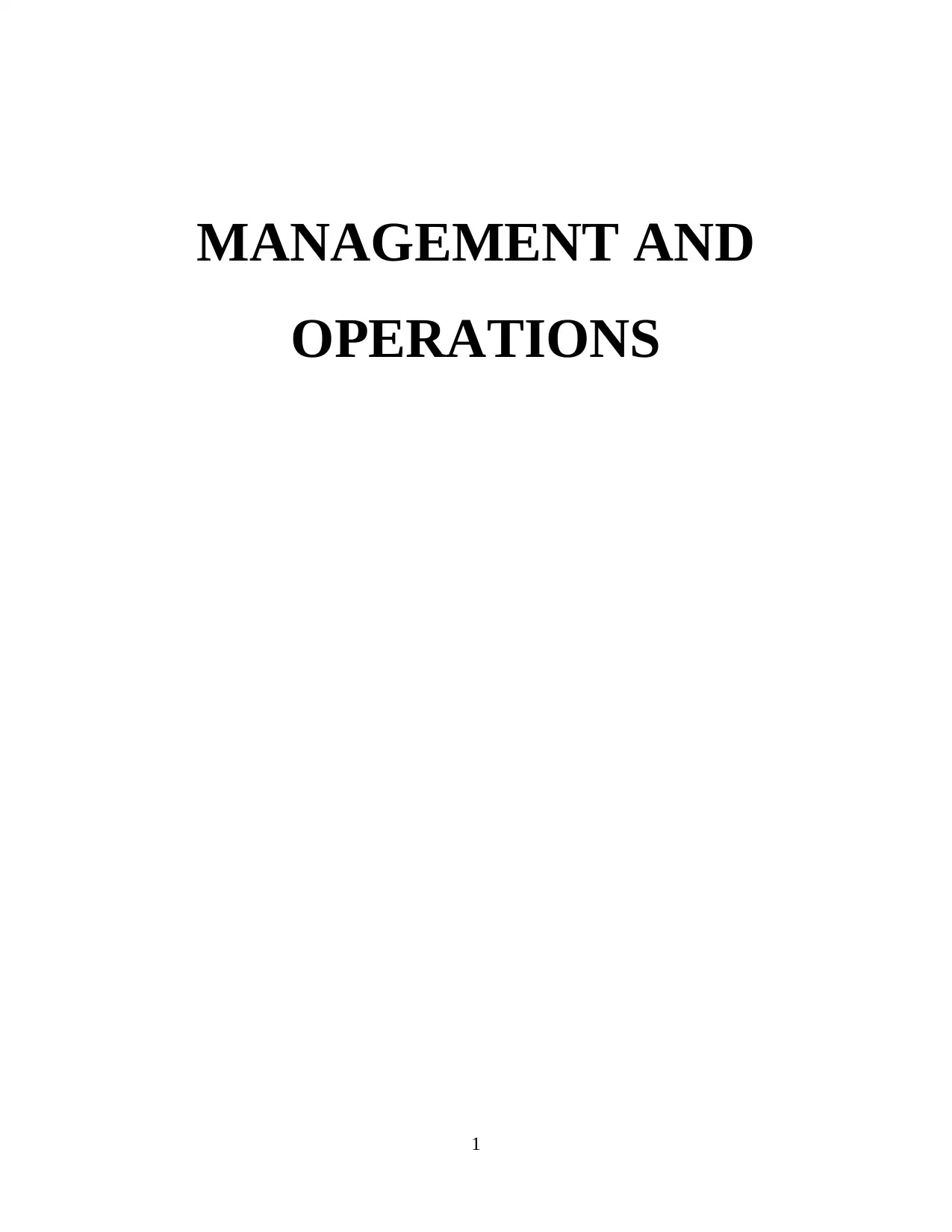
MANAGEMENT AND
OPERATIONS
1
OPERATIONS
1
Paraphrase This Document
Need a fresh take? Get an instant paraphrase of this document with our AI Paraphraser
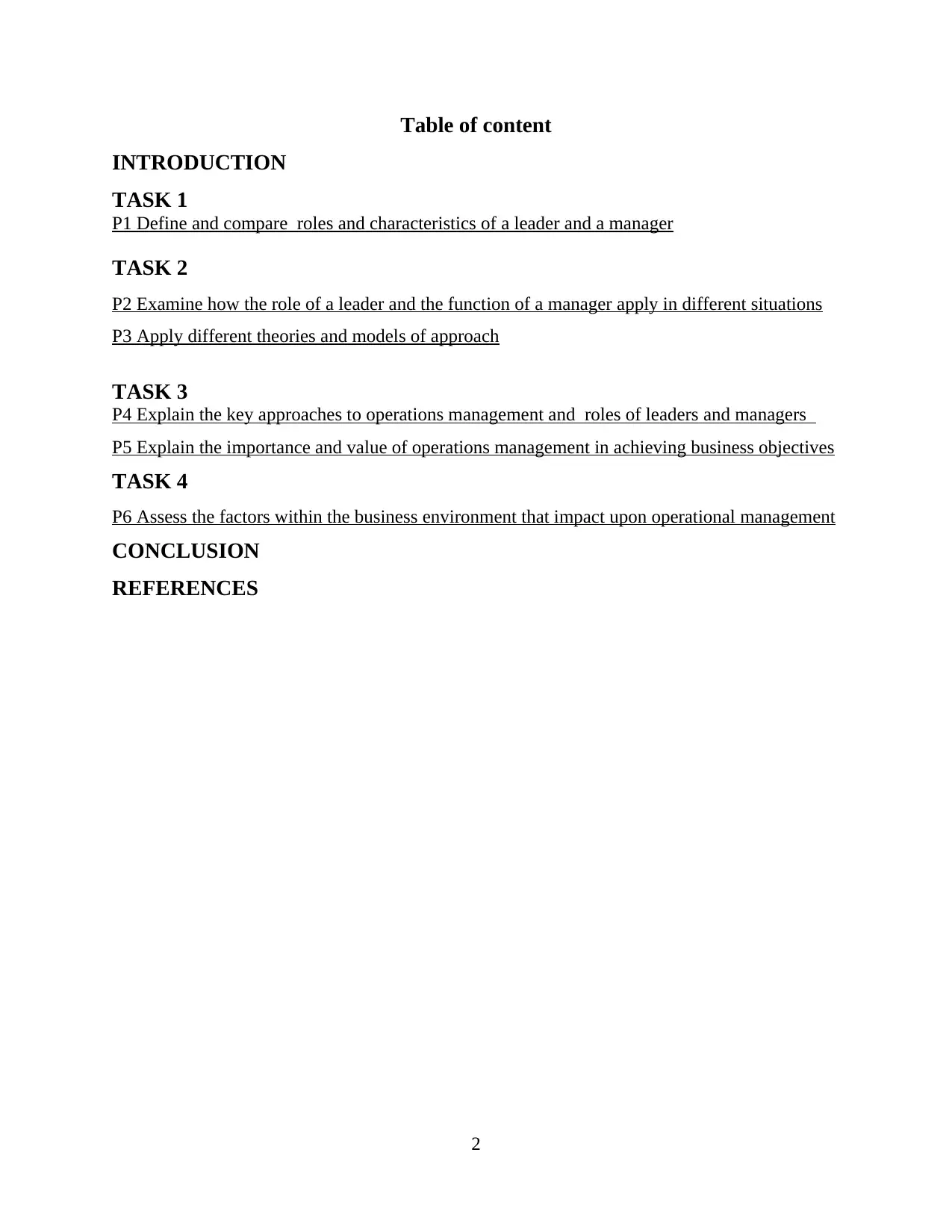
Table of content
INTRODUCTION
TASK 1
P1 Define and compare roles and characteristics of a leader and a manager
TASK 2
P2 Examine how the role of a leader and the function of a manager apply in different situations
P3 Apply different theories and models of approach
TASK 3
P4 Explain the key approaches to operations management and roles of leaders and managers
P5 Explain the importance and value of operations management in achieving business objectives
TASK 4
P6 Assess the factors within the business environment that impact upon operational management
CONCLUSION
REFERENCES
2
INTRODUCTION
TASK 1
P1 Define and compare roles and characteristics of a leader and a manager
TASK 2
P2 Examine how the role of a leader and the function of a manager apply in different situations
P3 Apply different theories and models of approach
TASK 3
P4 Explain the key approaches to operations management and roles of leaders and managers
P5 Explain the importance and value of operations management in achieving business objectives
TASK 4
P6 Assess the factors within the business environment that impact upon operational management
CONCLUSION
REFERENCES
2
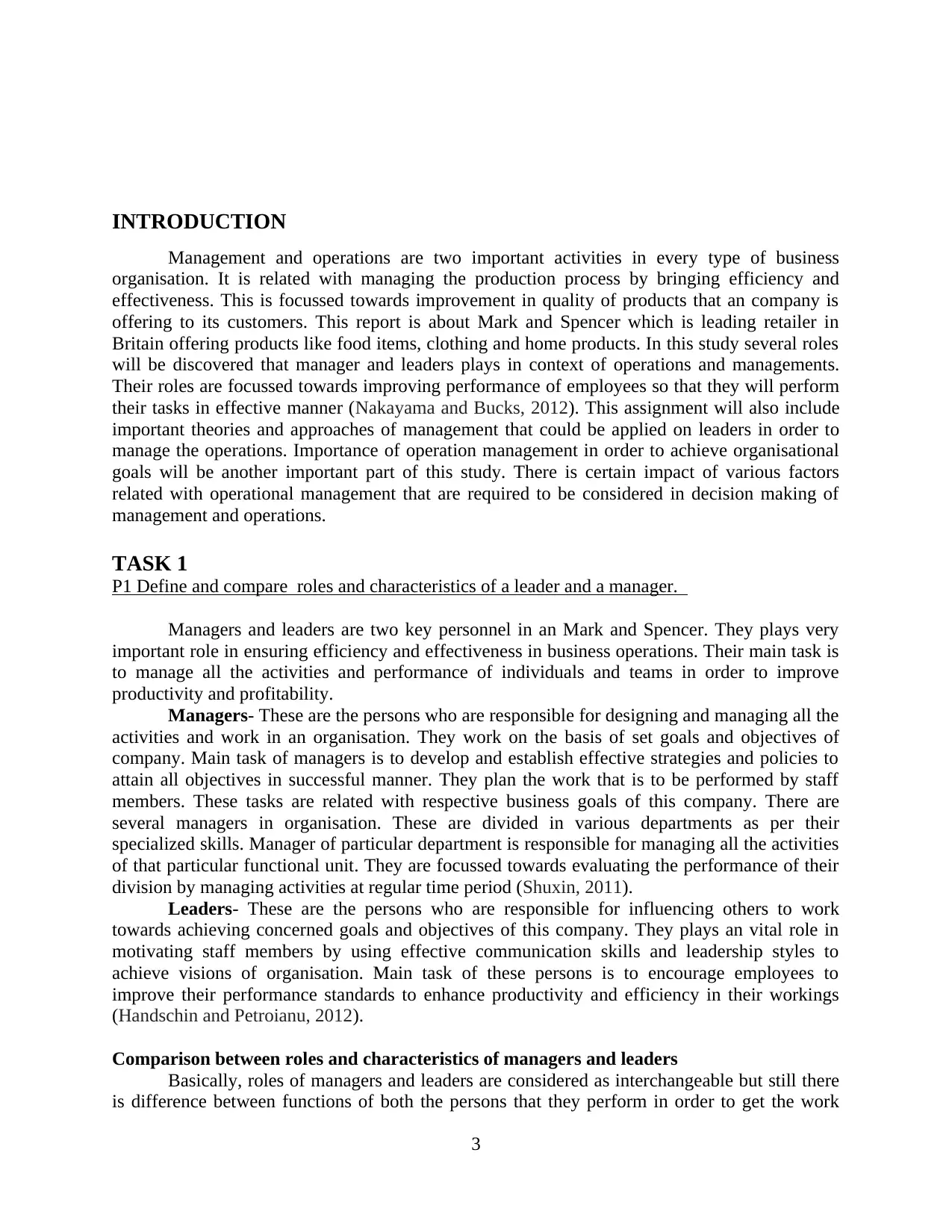
INTRODUCTION
Management and operations are two important activities in every type of business
organisation. It is related with managing the production process by bringing efficiency and
effectiveness. This is focussed towards improvement in quality of products that an company is
offering to its customers. This report is about Mark and Spencer which is leading retailer in
Britain offering products like food items, clothing and home products. In this study several roles
will be discovered that manager and leaders plays in context of operations and managements.
Their roles are focussed towards improving performance of employees so that they will perform
their tasks in effective manner (Nakayama and Bucks, 2012). This assignment will also include
important theories and approaches of management that could be applied on leaders in order to
manage the operations. Importance of operation management in order to achieve organisational
goals will be another important part of this study. There is certain impact of various factors
related with operational management that are required to be considered in decision making of
management and operations.
TASK 1
P1 Define and compare roles and characteristics of a leader and a manager.
Managers and leaders are two key personnel in an Mark and Spencer. They plays very
important role in ensuring efficiency and effectiveness in business operations. Their main task is
to manage all the activities and performance of individuals and teams in order to improve
productivity and profitability.
Managers- These are the persons who are responsible for designing and managing all the
activities and work in an organisation. They work on the basis of set goals and objectives of
company. Main task of managers is to develop and establish effective strategies and policies to
attain all objectives in successful manner. They plan the work that is to be performed by staff
members. These tasks are related with respective business goals of this company. There are
several managers in organisation. These are divided in various departments as per their
specialized skills. Manager of particular department is responsible for managing all the activities
of that particular functional unit. They are focussed towards evaluating the performance of their
division by managing activities at regular time period (Shuxin, 2011).
Leaders- These are the persons who are responsible for influencing others to work
towards achieving concerned goals and objectives of this company. They plays an vital role in
motivating staff members by using effective communication skills and leadership styles to
achieve visions of organisation. Main task of these persons is to encourage employees to
improve their performance standards to enhance productivity and efficiency in their workings
(Handschin and Petroianu, 2012).
Comparison between roles and characteristics of managers and leaders
Basically, roles of managers and leaders are considered as interchangeable but still there
is difference between functions of both the persons that they perform in order to get the work
3
Management and operations are two important activities in every type of business
organisation. It is related with managing the production process by bringing efficiency and
effectiveness. This is focussed towards improvement in quality of products that an company is
offering to its customers. This report is about Mark and Spencer which is leading retailer in
Britain offering products like food items, clothing and home products. In this study several roles
will be discovered that manager and leaders plays in context of operations and managements.
Their roles are focussed towards improving performance of employees so that they will perform
their tasks in effective manner (Nakayama and Bucks, 2012). This assignment will also include
important theories and approaches of management that could be applied on leaders in order to
manage the operations. Importance of operation management in order to achieve organisational
goals will be another important part of this study. There is certain impact of various factors
related with operational management that are required to be considered in decision making of
management and operations.
TASK 1
P1 Define and compare roles and characteristics of a leader and a manager.
Managers and leaders are two key personnel in an Mark and Spencer. They plays very
important role in ensuring efficiency and effectiveness in business operations. Their main task is
to manage all the activities and performance of individuals and teams in order to improve
productivity and profitability.
Managers- These are the persons who are responsible for designing and managing all the
activities and work in an organisation. They work on the basis of set goals and objectives of
company. Main task of managers is to develop and establish effective strategies and policies to
attain all objectives in successful manner. They plan the work that is to be performed by staff
members. These tasks are related with respective business goals of this company. There are
several managers in organisation. These are divided in various departments as per their
specialized skills. Manager of particular department is responsible for managing all the activities
of that particular functional unit. They are focussed towards evaluating the performance of their
division by managing activities at regular time period (Shuxin, 2011).
Leaders- These are the persons who are responsible for influencing others to work
towards achieving concerned goals and objectives of this company. They plays an vital role in
motivating staff members by using effective communication skills and leadership styles to
achieve visions of organisation. Main task of these persons is to encourage employees to
improve their performance standards to enhance productivity and efficiency in their workings
(Handschin and Petroianu, 2012).
Comparison between roles and characteristics of managers and leaders
Basically, roles of managers and leaders are considered as interchangeable but still there
is difference between functions of both the persons that they perform in order to get the work
3
⊘ This is a preview!⊘
Do you want full access?
Subscribe today to unlock all pages.

Trusted by 1+ million students worldwide
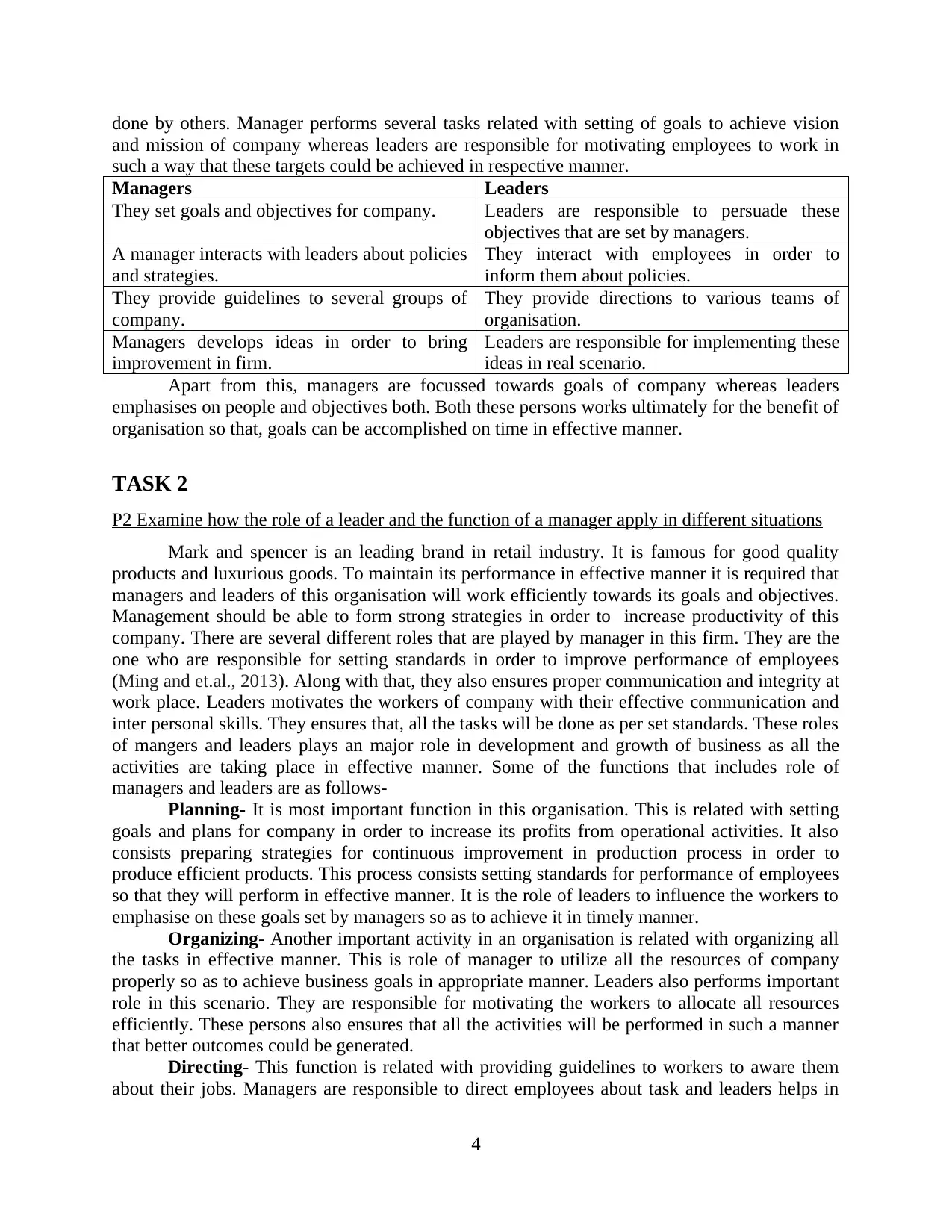
done by others. Manager performs several tasks related with setting of goals to achieve vision
and mission of company whereas leaders are responsible for motivating employees to work in
such a way that these targets could be achieved in respective manner.
Managers Leaders
They set goals and objectives for company. Leaders are responsible to persuade these
objectives that are set by managers.
A manager interacts with leaders about policies
and strategies.
They interact with employees in order to
inform them about policies.
They provide guidelines to several groups of
company.
They provide directions to various teams of
organisation.
Managers develops ideas in order to bring
improvement in firm.
Leaders are responsible for implementing these
ideas in real scenario.
Apart from this, managers are focussed towards goals of company whereas leaders
emphasises on people and objectives both. Both these persons works ultimately for the benefit of
organisation so that, goals can be accomplished on time in effective manner.
TASK 2
P2 Examine how the role of a leader and the function of a manager apply in different situations
Mark and spencer is an leading brand in retail industry. It is famous for good quality
products and luxurious goods. To maintain its performance in effective manner it is required that
managers and leaders of this organisation will work efficiently towards its goals and objectives.
Management should be able to form strong strategies in order to increase productivity of this
company. There are several different roles that are played by manager in this firm. They are the
one who are responsible for setting standards in order to improve performance of employees
(Ming and et.al., 2013). Along with that, they also ensures proper communication and integrity at
work place. Leaders motivates the workers of company with their effective communication and
inter personal skills. They ensures that, all the tasks will be done as per set standards. These roles
of mangers and leaders plays an major role in development and growth of business as all the
activities are taking place in effective manner. Some of the functions that includes role of
managers and leaders are as follows-
Planning- It is most important function in this organisation. This is related with setting
goals and plans for company in order to increase its profits from operational activities. It also
consists preparing strategies for continuous improvement in production process in order to
produce efficient products. This process consists setting standards for performance of employees
so that they will perform in effective manner. It is the role of leaders to influence the workers to
emphasise on these goals set by managers so as to achieve it in timely manner.
Organizing- Another important activity in an organisation is related with organizing all
the tasks in effective manner. This is role of manager to utilize all the resources of company
properly so as to achieve business goals in appropriate manner. Leaders also performs important
role in this scenario. They are responsible for motivating the workers to allocate all resources
efficiently. These persons also ensures that all the activities will be performed in such a manner
that better outcomes could be generated.
Directing- This function is related with providing guidelines to workers to aware them
about their jobs. Managers are responsible to direct employees about task and leaders helps in
4
and mission of company whereas leaders are responsible for motivating employees to work in
such a way that these targets could be achieved in respective manner.
Managers Leaders
They set goals and objectives for company. Leaders are responsible to persuade these
objectives that are set by managers.
A manager interacts with leaders about policies
and strategies.
They interact with employees in order to
inform them about policies.
They provide guidelines to several groups of
company.
They provide directions to various teams of
organisation.
Managers develops ideas in order to bring
improvement in firm.
Leaders are responsible for implementing these
ideas in real scenario.
Apart from this, managers are focussed towards goals of company whereas leaders
emphasises on people and objectives both. Both these persons works ultimately for the benefit of
organisation so that, goals can be accomplished on time in effective manner.
TASK 2
P2 Examine how the role of a leader and the function of a manager apply in different situations
Mark and spencer is an leading brand in retail industry. It is famous for good quality
products and luxurious goods. To maintain its performance in effective manner it is required that
managers and leaders of this organisation will work efficiently towards its goals and objectives.
Management should be able to form strong strategies in order to increase productivity of this
company. There are several different roles that are played by manager in this firm. They are the
one who are responsible for setting standards in order to improve performance of employees
(Ming and et.al., 2013). Along with that, they also ensures proper communication and integrity at
work place. Leaders motivates the workers of company with their effective communication and
inter personal skills. They ensures that, all the tasks will be done as per set standards. These roles
of mangers and leaders plays an major role in development and growth of business as all the
activities are taking place in effective manner. Some of the functions that includes role of
managers and leaders are as follows-
Planning- It is most important function in this organisation. This is related with setting
goals and plans for company in order to increase its profits from operational activities. It also
consists preparing strategies for continuous improvement in production process in order to
produce efficient products. This process consists setting standards for performance of employees
so that they will perform in effective manner. It is the role of leaders to influence the workers to
emphasise on these goals set by managers so as to achieve it in timely manner.
Organizing- Another important activity in an organisation is related with organizing all
the tasks in effective manner. This is role of manager to utilize all the resources of company
properly so as to achieve business goals in appropriate manner. Leaders also performs important
role in this scenario. They are responsible for motivating the workers to allocate all resources
efficiently. These persons also ensures that all the activities will be performed in such a manner
that better outcomes could be generated.
Directing- This function is related with providing guidelines to workers to aware them
about their jobs. Managers are responsible to direct employees about task and leaders helps in
4
Paraphrase This Document
Need a fresh take? Get an instant paraphrase of this document with our AI Paraphraser
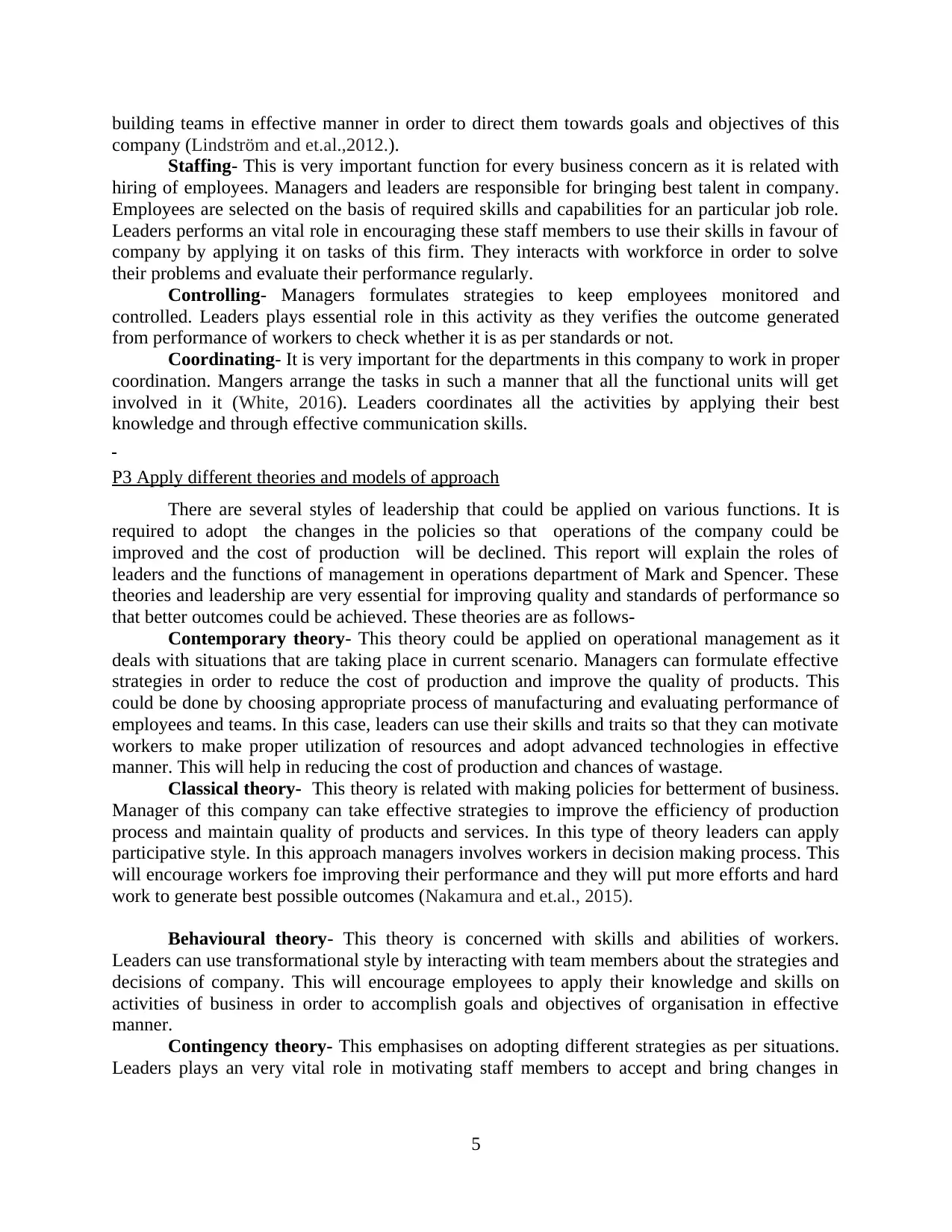
building teams in effective manner in order to direct them towards goals and objectives of this
company (Lindström and et.al.,2012.).
Staffing- This is very important function for every business concern as it is related with
hiring of employees. Managers and leaders are responsible for bringing best talent in company.
Employees are selected on the basis of required skills and capabilities for an particular job role.
Leaders performs an vital role in encouraging these staff members to use their skills in favour of
company by applying it on tasks of this firm. They interacts with workforce in order to solve
their problems and evaluate their performance regularly.
Controlling- Managers formulates strategies to keep employees monitored and
controlled. Leaders plays essential role in this activity as they verifies the outcome generated
from performance of workers to check whether it is as per standards or not.
Coordinating- It is very important for the departments in this company to work in proper
coordination. Mangers arrange the tasks in such a manner that all the functional units will get
involved in it (White, 2016). Leaders coordinates all the activities by applying their best
knowledge and through effective communication skills.
P3 Apply different theories and models of approach
There are several styles of leadership that could be applied on various functions. It is
required to adopt the changes in the policies so that operations of the company could be
improved and the cost of production will be declined. This report will explain the roles of
leaders and the functions of management in operations department of Mark and Spencer. These
theories and leadership are very essential for improving quality and standards of performance so
that better outcomes could be achieved. These theories are as follows-
Contemporary theory- This theory could be applied on operational management as it
deals with situations that are taking place in current scenario. Managers can formulate effective
strategies in order to reduce the cost of production and improve the quality of products. This
could be done by choosing appropriate process of manufacturing and evaluating performance of
employees and teams. In this case, leaders can use their skills and traits so that they can motivate
workers to make proper utilization of resources and adopt advanced technologies in effective
manner. This will help in reducing the cost of production and chances of wastage.
Classical theory- This theory is related with making policies for betterment of business.
Manager of this company can take effective strategies to improve the efficiency of production
process and maintain quality of products and services. In this type of theory leaders can apply
participative style. In this approach managers involves workers in decision making process. This
will encourage workers foe improving their performance and they will put more efforts and hard
work to generate best possible outcomes (Nakamura and et.al., 2015).
Behavioural theory- This theory is concerned with skills and abilities of workers.
Leaders can use transformational style by interacting with team members about the strategies and
decisions of company. This will encourage employees to apply their knowledge and skills on
activities of business in order to accomplish goals and objectives of organisation in effective
manner.
Contingency theory- This emphasises on adopting different strategies as per situations.
Leaders plays an very vital role in motivating staff members to accept and bring changes in
5
company (Lindström and et.al.,2012.).
Staffing- This is very important function for every business concern as it is related with
hiring of employees. Managers and leaders are responsible for bringing best talent in company.
Employees are selected on the basis of required skills and capabilities for an particular job role.
Leaders performs an vital role in encouraging these staff members to use their skills in favour of
company by applying it on tasks of this firm. They interacts with workforce in order to solve
their problems and evaluate their performance regularly.
Controlling- Managers formulates strategies to keep employees monitored and
controlled. Leaders plays essential role in this activity as they verifies the outcome generated
from performance of workers to check whether it is as per standards or not.
Coordinating- It is very important for the departments in this company to work in proper
coordination. Mangers arrange the tasks in such a manner that all the functional units will get
involved in it (White, 2016). Leaders coordinates all the activities by applying their best
knowledge and through effective communication skills.
P3 Apply different theories and models of approach
There are several styles of leadership that could be applied on various functions. It is
required to adopt the changes in the policies so that operations of the company could be
improved and the cost of production will be declined. This report will explain the roles of
leaders and the functions of management in operations department of Mark and Spencer. These
theories and leadership are very essential for improving quality and standards of performance so
that better outcomes could be achieved. These theories are as follows-
Contemporary theory- This theory could be applied on operational management as it
deals with situations that are taking place in current scenario. Managers can formulate effective
strategies in order to reduce the cost of production and improve the quality of products. This
could be done by choosing appropriate process of manufacturing and evaluating performance of
employees and teams. In this case, leaders can use their skills and traits so that they can motivate
workers to make proper utilization of resources and adopt advanced technologies in effective
manner. This will help in reducing the cost of production and chances of wastage.
Classical theory- This theory is related with making policies for betterment of business.
Manager of this company can take effective strategies to improve the efficiency of production
process and maintain quality of products and services. In this type of theory leaders can apply
participative style. In this approach managers involves workers in decision making process. This
will encourage workers foe improving their performance and they will put more efforts and hard
work to generate best possible outcomes (Nakamura and et.al., 2015).
Behavioural theory- This theory is concerned with skills and abilities of workers.
Leaders can use transformational style by interacting with team members about the strategies and
decisions of company. This will encourage employees to apply their knowledge and skills on
activities of business in order to accomplish goals and objectives of organisation in effective
manner.
Contingency theory- This emphasises on adopting different strategies as per situations.
Leaders plays an very vital role in motivating staff members to accept and bring changes in
5
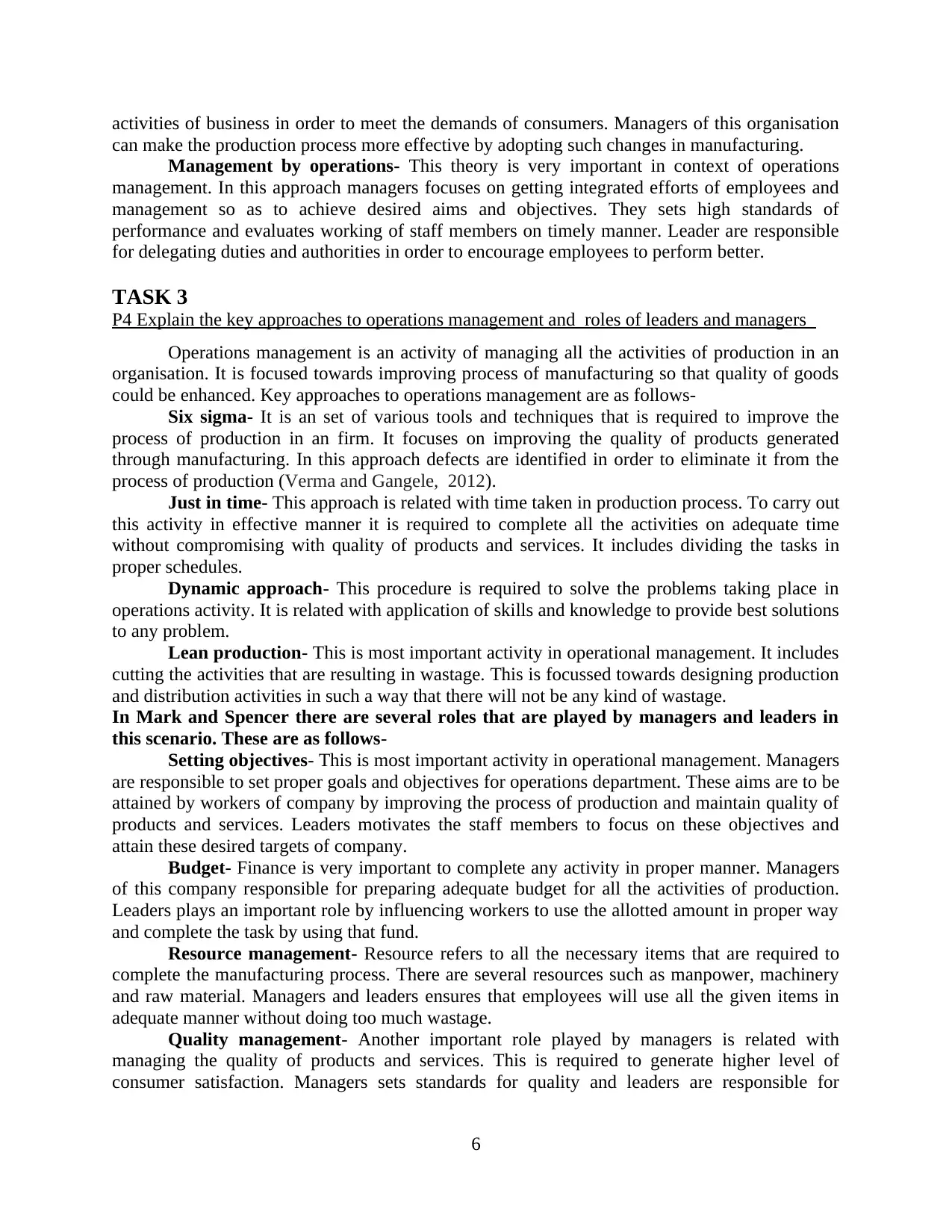
activities of business in order to meet the demands of consumers. Managers of this organisation
can make the production process more effective by adopting such changes in manufacturing.
Management by operations- This theory is very important in context of operations
management. In this approach managers focuses on getting integrated efforts of employees and
management so as to achieve desired aims and objectives. They sets high standards of
performance and evaluates working of staff members on timely manner. Leader are responsible
for delegating duties and authorities in order to encourage employees to perform better.
TASK 3
P4 Explain the key approaches to operations management and roles of leaders and managers
Operations management is an activity of managing all the activities of production in an
organisation. It is focused towards improving process of manufacturing so that quality of goods
could be enhanced. Key approaches to operations management are as follows-
Six sigma- It is an set of various tools and techniques that is required to improve the
process of production in an firm. It focuses on improving the quality of products generated
through manufacturing. In this approach defects are identified in order to eliminate it from the
process of production (Verma and Gangele, 2012).
Just in time- This approach is related with time taken in production process. To carry out
this activity in effective manner it is required to complete all the activities on adequate time
without compromising with quality of products and services. It includes dividing the tasks in
proper schedules.
Dynamic approach- This procedure is required to solve the problems taking place in
operations activity. It is related with application of skills and knowledge to provide best solutions
to any problem.
Lean production- This is most important activity in operational management. It includes
cutting the activities that are resulting in wastage. This is focussed towards designing production
and distribution activities in such a way that there will not be any kind of wastage.
In Mark and Spencer there are several roles that are played by managers and leaders in
this scenario. These are as follows-
Setting objectives- This is most important activity in operational management. Managers
are responsible to set proper goals and objectives for operations department. These aims are to be
attained by workers of company by improving the process of production and maintain quality of
products and services. Leaders motivates the staff members to focus on these objectives and
attain these desired targets of company.
Budget- Finance is very important to complete any activity in proper manner. Managers
of this company responsible for preparing adequate budget for all the activities of production.
Leaders plays an important role by influencing workers to use the allotted amount in proper way
and complete the task by using that fund.
Resource management- Resource refers to all the necessary items that are required to
complete the manufacturing process. There are several resources such as manpower, machinery
and raw material. Managers and leaders ensures that employees will use all the given items in
adequate manner without doing too much wastage.
Quality management- Another important role played by managers is related with
managing the quality of products and services. This is required to generate higher level of
consumer satisfaction. Managers sets standards for quality and leaders are responsible for
6
can make the production process more effective by adopting such changes in manufacturing.
Management by operations- This theory is very important in context of operations
management. In this approach managers focuses on getting integrated efforts of employees and
management so as to achieve desired aims and objectives. They sets high standards of
performance and evaluates working of staff members on timely manner. Leader are responsible
for delegating duties and authorities in order to encourage employees to perform better.
TASK 3
P4 Explain the key approaches to operations management and roles of leaders and managers
Operations management is an activity of managing all the activities of production in an
organisation. It is focused towards improving process of manufacturing so that quality of goods
could be enhanced. Key approaches to operations management are as follows-
Six sigma- It is an set of various tools and techniques that is required to improve the
process of production in an firm. It focuses on improving the quality of products generated
through manufacturing. In this approach defects are identified in order to eliminate it from the
process of production (Verma and Gangele, 2012).
Just in time- This approach is related with time taken in production process. To carry out
this activity in effective manner it is required to complete all the activities on adequate time
without compromising with quality of products and services. It includes dividing the tasks in
proper schedules.
Dynamic approach- This procedure is required to solve the problems taking place in
operations activity. It is related with application of skills and knowledge to provide best solutions
to any problem.
Lean production- This is most important activity in operational management. It includes
cutting the activities that are resulting in wastage. This is focussed towards designing production
and distribution activities in such a way that there will not be any kind of wastage.
In Mark and Spencer there are several roles that are played by managers and leaders in
this scenario. These are as follows-
Setting objectives- This is most important activity in operational management. Managers
are responsible to set proper goals and objectives for operations department. These aims are to be
attained by workers of company by improving the process of production and maintain quality of
products and services. Leaders motivates the staff members to focus on these objectives and
attain these desired targets of company.
Budget- Finance is very important to complete any activity in proper manner. Managers
of this company responsible for preparing adequate budget for all the activities of production.
Leaders plays an important role by influencing workers to use the allotted amount in proper way
and complete the task by using that fund.
Resource management- Resource refers to all the necessary items that are required to
complete the manufacturing process. There are several resources such as manpower, machinery
and raw material. Managers and leaders ensures that employees will use all the given items in
adequate manner without doing too much wastage.
Quality management- Another important role played by managers is related with
managing the quality of products and services. This is required to generate higher level of
consumer satisfaction. Managers sets standards for quality and leaders are responsible for
6
⊘ This is a preview!⊘
Do you want full access?
Subscribe today to unlock all pages.

Trusted by 1+ million students worldwide
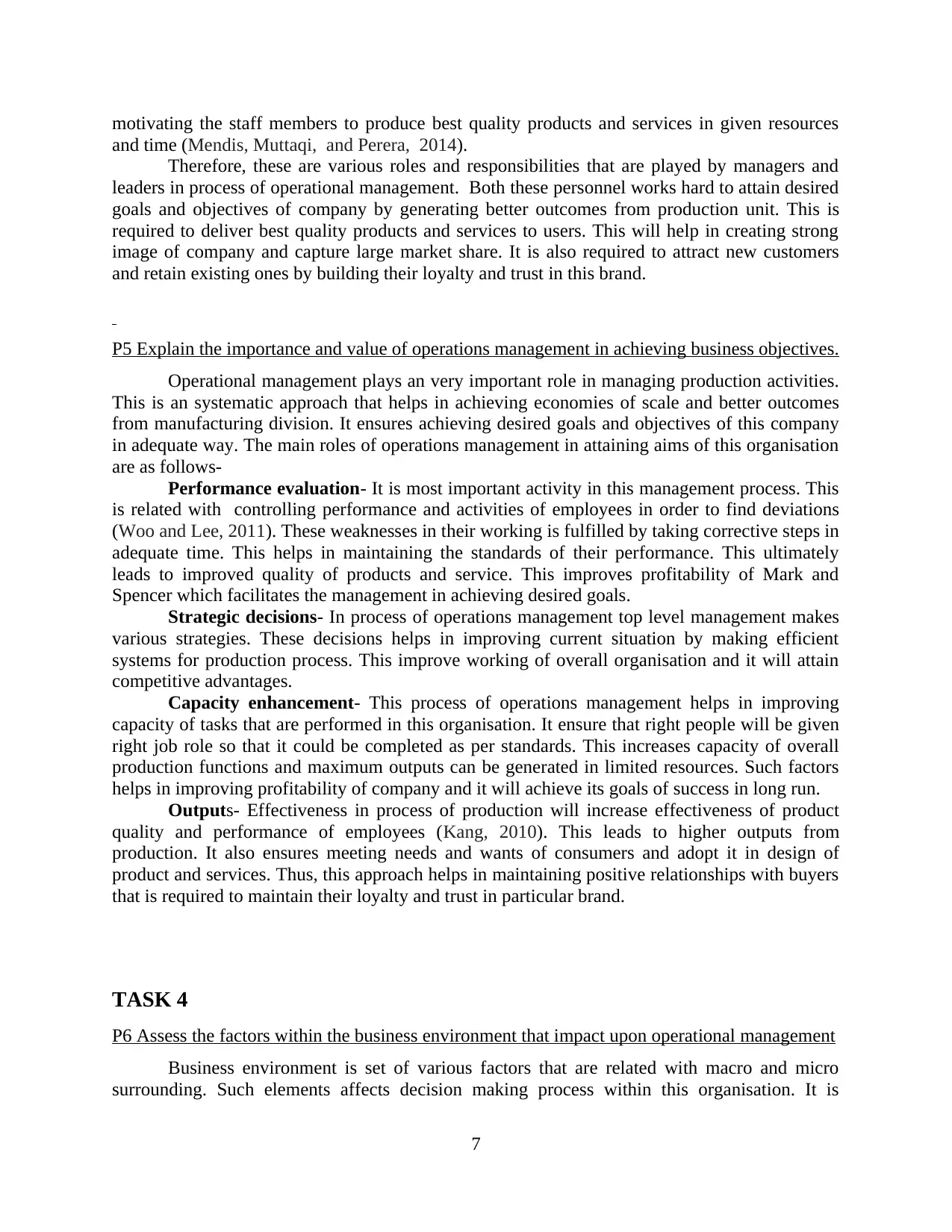
motivating the staff members to produce best quality products and services in given resources
and time (Mendis, Muttaqi, and Perera, 2014).
Therefore, these are various roles and responsibilities that are played by managers and
leaders in process of operational management. Both these personnel works hard to attain desired
goals and objectives of company by generating better outcomes from production unit. This is
required to deliver best quality products and services to users. This will help in creating strong
image of company and capture large market share. It is also required to attract new customers
and retain existing ones by building their loyalty and trust in this brand.
P5 Explain the importance and value of operations management in achieving business objectives.
Operational management plays an very important role in managing production activities.
This is an systematic approach that helps in achieving economies of scale and better outcomes
from manufacturing division. It ensures achieving desired goals and objectives of this company
in adequate way. The main roles of operations management in attaining aims of this organisation
are as follows-
Performance evaluation- It is most important activity in this management process. This
is related with controlling performance and activities of employees in order to find deviations
(Woo and Lee, 2011). These weaknesses in their working is fulfilled by taking corrective steps in
adequate time. This helps in maintaining the standards of their performance. This ultimately
leads to improved quality of products and service. This improves profitability of Mark and
Spencer which facilitates the management in achieving desired goals.
Strategic decisions- In process of operations management top level management makes
various strategies. These decisions helps in improving current situation by making efficient
systems for production process. This improve working of overall organisation and it will attain
competitive advantages.
Capacity enhancement- This process of operations management helps in improving
capacity of tasks that are performed in this organisation. It ensure that right people will be given
right job role so that it could be completed as per standards. This increases capacity of overall
production functions and maximum outputs can be generated in limited resources. Such factors
helps in improving profitability of company and it will achieve its goals of success in long run.
Outputs- Effectiveness in process of production will increase effectiveness of product
quality and performance of employees (Kang, 2010). This leads to higher outputs from
production. It also ensures meeting needs and wants of consumers and adopt it in design of
product and services. Thus, this approach helps in maintaining positive relationships with buyers
that is required to maintain their loyalty and trust in particular brand.
TASK 4
P6 Assess the factors within the business environment that impact upon operational management
Business environment is set of various factors that are related with macro and micro
surrounding. Such elements affects decision making process within this organisation. It is
7
and time (Mendis, Muttaqi, and Perera, 2014).
Therefore, these are various roles and responsibilities that are played by managers and
leaders in process of operational management. Both these personnel works hard to attain desired
goals and objectives of company by generating better outcomes from production unit. This is
required to deliver best quality products and services to users. This will help in creating strong
image of company and capture large market share. It is also required to attract new customers
and retain existing ones by building their loyalty and trust in this brand.
P5 Explain the importance and value of operations management in achieving business objectives.
Operational management plays an very important role in managing production activities.
This is an systematic approach that helps in achieving economies of scale and better outcomes
from manufacturing division. It ensures achieving desired goals and objectives of this company
in adequate way. The main roles of operations management in attaining aims of this organisation
are as follows-
Performance evaluation- It is most important activity in this management process. This
is related with controlling performance and activities of employees in order to find deviations
(Woo and Lee, 2011). These weaknesses in their working is fulfilled by taking corrective steps in
adequate time. This helps in maintaining the standards of their performance. This ultimately
leads to improved quality of products and service. This improves profitability of Mark and
Spencer which facilitates the management in achieving desired goals.
Strategic decisions- In process of operations management top level management makes
various strategies. These decisions helps in improving current situation by making efficient
systems for production process. This improve working of overall organisation and it will attain
competitive advantages.
Capacity enhancement- This process of operations management helps in improving
capacity of tasks that are performed in this organisation. It ensure that right people will be given
right job role so that it could be completed as per standards. This increases capacity of overall
production functions and maximum outputs can be generated in limited resources. Such factors
helps in improving profitability of company and it will achieve its goals of success in long run.
Outputs- Effectiveness in process of production will increase effectiveness of product
quality and performance of employees (Kang, 2010). This leads to higher outputs from
production. It also ensures meeting needs and wants of consumers and adopt it in design of
product and services. Thus, this approach helps in maintaining positive relationships with buyers
that is required to maintain their loyalty and trust in particular brand.
TASK 4
P6 Assess the factors within the business environment that impact upon operational management
Business environment is set of various factors that are related with macro and micro
surrounding. Such elements affects decision making process within this organisation. It is
7
Paraphrase This Document
Need a fresh take? Get an instant paraphrase of this document with our AI Paraphraser
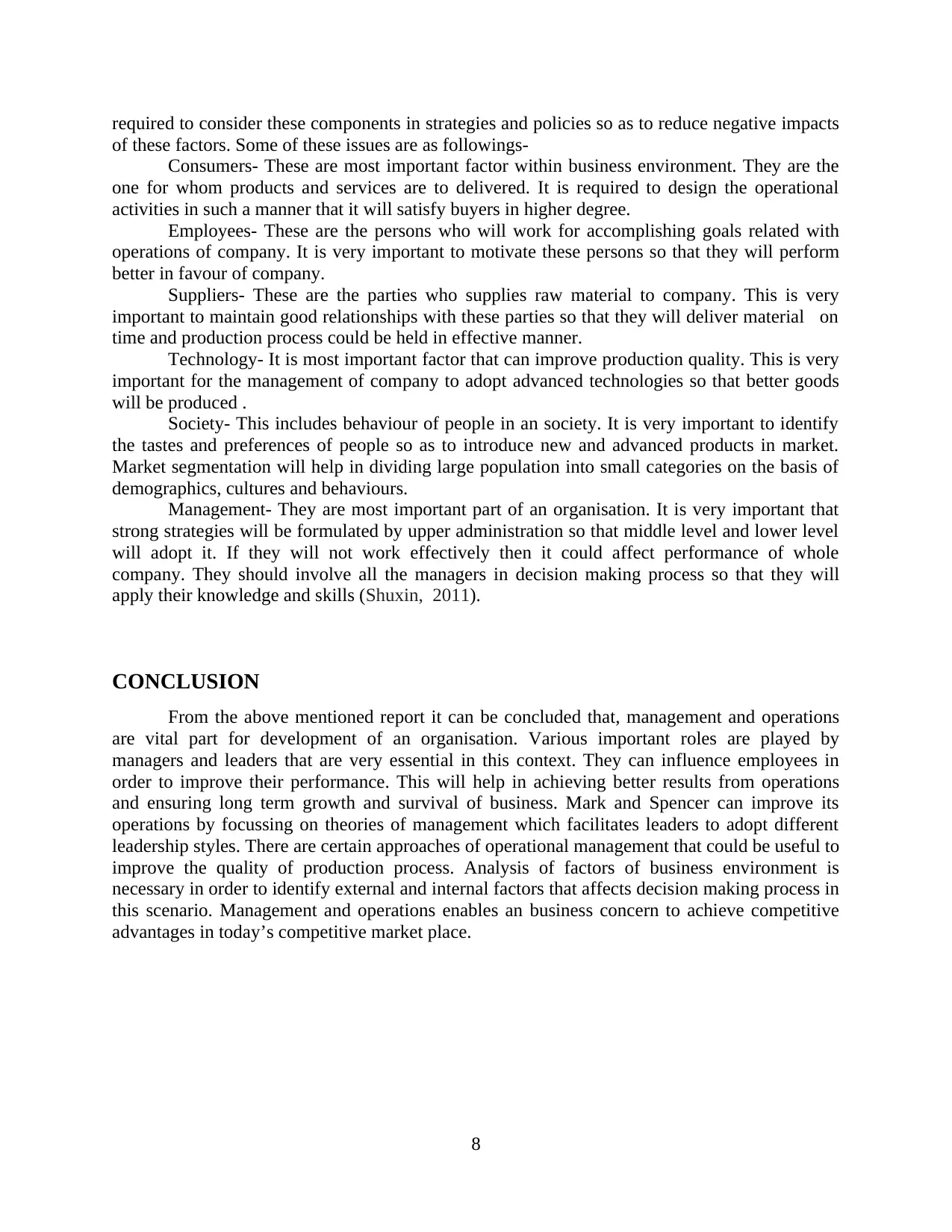
required to consider these components in strategies and policies so as to reduce negative impacts
of these factors. Some of these issues are as followings-
Consumers- These are most important factor within business environment. They are the
one for whom products and services are to delivered. It is required to design the operational
activities in such a manner that it will satisfy buyers in higher degree.
Employees- These are the persons who will work for accomplishing goals related with
operations of company. It is very important to motivate these persons so that they will perform
better in favour of company.
Suppliers- These are the parties who supplies raw material to company. This is very
important to maintain good relationships with these parties so that they will deliver material on
time and production process could be held in effective manner.
Technology- It is most important factor that can improve production quality. This is very
important for the management of company to adopt advanced technologies so that better goods
will be produced .
Society- This includes behaviour of people in an society. It is very important to identify
the tastes and preferences of people so as to introduce new and advanced products in market.
Market segmentation will help in dividing large population into small categories on the basis of
demographics, cultures and behaviours.
Management- They are most important part of an organisation. It is very important that
strong strategies will be formulated by upper administration so that middle level and lower level
will adopt it. If they will not work effectively then it could affect performance of whole
company. They should involve all the managers in decision making process so that they will
apply their knowledge and skills (Shuxin, 2011).
CONCLUSION
From the above mentioned report it can be concluded that, management and operations
are vital part for development of an organisation. Various important roles are played by
managers and leaders that are very essential in this context. They can influence employees in
order to improve their performance. This will help in achieving better results from operations
and ensuring long term growth and survival of business. Mark and Spencer can improve its
operations by focussing on theories of management which facilitates leaders to adopt different
leadership styles. There are certain approaches of operational management that could be useful to
improve the quality of production process. Analysis of factors of business environment is
necessary in order to identify external and internal factors that affects decision making process in
this scenario. Management and operations enables an business concern to achieve competitive
advantages in today’s competitive market place.
8
of these factors. Some of these issues are as followings-
Consumers- These are most important factor within business environment. They are the
one for whom products and services are to delivered. It is required to design the operational
activities in such a manner that it will satisfy buyers in higher degree.
Employees- These are the persons who will work for accomplishing goals related with
operations of company. It is very important to motivate these persons so that they will perform
better in favour of company.
Suppliers- These are the parties who supplies raw material to company. This is very
important to maintain good relationships with these parties so that they will deliver material on
time and production process could be held in effective manner.
Technology- It is most important factor that can improve production quality. This is very
important for the management of company to adopt advanced technologies so that better goods
will be produced .
Society- This includes behaviour of people in an society. It is very important to identify
the tastes and preferences of people so as to introduce new and advanced products in market.
Market segmentation will help in dividing large population into small categories on the basis of
demographics, cultures and behaviours.
Management- They are most important part of an organisation. It is very important that
strong strategies will be formulated by upper administration so that middle level and lower level
will adopt it. If they will not work effectively then it could affect performance of whole
company. They should involve all the managers in decision making process so that they will
apply their knowledge and skills (Shuxin, 2011).
CONCLUSION
From the above mentioned report it can be concluded that, management and operations
are vital part for development of an organisation. Various important roles are played by
managers and leaders that are very essential in this context. They can influence employees in
order to improve their performance. This will help in achieving better results from operations
and ensuring long term growth and survival of business. Mark and Spencer can improve its
operations by focussing on theories of management which facilitates leaders to adopt different
leadership styles. There are certain approaches of operational management that could be useful to
improve the quality of production process. Analysis of factors of business environment is
necessary in order to identify external and internal factors that affects decision making process in
this scenario. Management and operations enables an business concern to achieve competitive
advantages in today’s competitive market place.
8
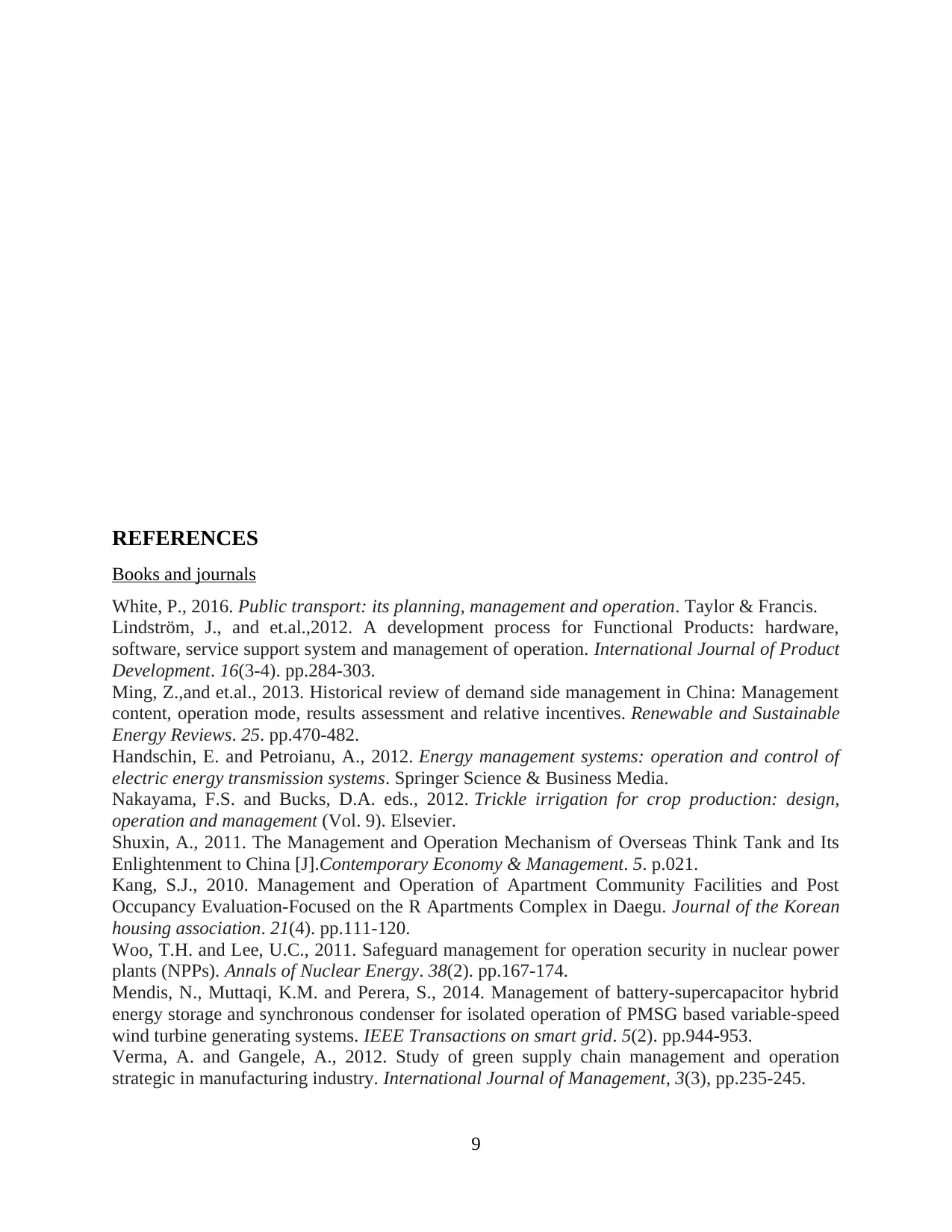
REFERENCES
Books and journals
White, P., 2016. Public transport: its planning, management and operation. Taylor & Francis.
Lindström, J., and et.al.,2012. A development process for Functional Products: hardware,
software, service support system and management of operation. International Journal of Product
Development. 16(3-4). pp.284-303.
Ming, Z.,and et.al., 2013. Historical review of demand side management in China: Management
content, operation mode, results assessment and relative incentives. Renewable and Sustainable
Energy Reviews. 25. pp.470-482.
Handschin, E. and Petroianu, A., 2012. Energy management systems: operation and control of
electric energy transmission systems. Springer Science & Business Media.
Nakayama, F.S. and Bucks, D.A. eds., 2012. Trickle irrigation for crop production: design,
operation and management (Vol. 9). Elsevier.
Shuxin, A., 2011. The Management and Operation Mechanism of Overseas Think Tank and Its
Enlightenment to China [J].Contemporary Economy & Management. 5. p.021.
Kang, S.J., 2010. Management and Operation of Apartment Community Facilities and Post
Occupancy Evaluation-Focused on the R Apartments Complex in Daegu. Journal of the Korean
housing association. 21(4). pp.111-120.
Woo, T.H. and Lee, U.C., 2011. Safeguard management for operation security in nuclear power
plants (NPPs). Annals of Nuclear Energy. 38(2). pp.167-174.
Mendis, N., Muttaqi, K.M. and Perera, S., 2014. Management of battery-supercapacitor hybrid
energy storage and synchronous condenser for isolated operation of PMSG based variable-speed
wind turbine generating systems. IEEE Transactions on smart grid. 5(2). pp.944-953.
Verma, A. and Gangele, A., 2012. Study of green supply chain management and operation
strategic in manufacturing industry. International Journal of Management, 3(3), pp.235-245.
9
Books and journals
White, P., 2016. Public transport: its planning, management and operation. Taylor & Francis.
Lindström, J., and et.al.,2012. A development process for Functional Products: hardware,
software, service support system and management of operation. International Journal of Product
Development. 16(3-4). pp.284-303.
Ming, Z.,and et.al., 2013. Historical review of demand side management in China: Management
content, operation mode, results assessment and relative incentives. Renewable and Sustainable
Energy Reviews. 25. pp.470-482.
Handschin, E. and Petroianu, A., 2012. Energy management systems: operation and control of
electric energy transmission systems. Springer Science & Business Media.
Nakayama, F.S. and Bucks, D.A. eds., 2012. Trickle irrigation for crop production: design,
operation and management (Vol. 9). Elsevier.
Shuxin, A., 2011. The Management and Operation Mechanism of Overseas Think Tank and Its
Enlightenment to China [J].Contemporary Economy & Management. 5. p.021.
Kang, S.J., 2010. Management and Operation of Apartment Community Facilities and Post
Occupancy Evaluation-Focused on the R Apartments Complex in Daegu. Journal of the Korean
housing association. 21(4). pp.111-120.
Woo, T.H. and Lee, U.C., 2011. Safeguard management for operation security in nuclear power
plants (NPPs). Annals of Nuclear Energy. 38(2). pp.167-174.
Mendis, N., Muttaqi, K.M. and Perera, S., 2014. Management of battery-supercapacitor hybrid
energy storage and synchronous condenser for isolated operation of PMSG based variable-speed
wind turbine generating systems. IEEE Transactions on smart grid. 5(2). pp.944-953.
Verma, A. and Gangele, A., 2012. Study of green supply chain management and operation
strategic in manufacturing industry. International Journal of Management, 3(3), pp.235-245.
9
⊘ This is a preview!⊘
Do you want full access?
Subscribe today to unlock all pages.

Trusted by 1+ million students worldwide
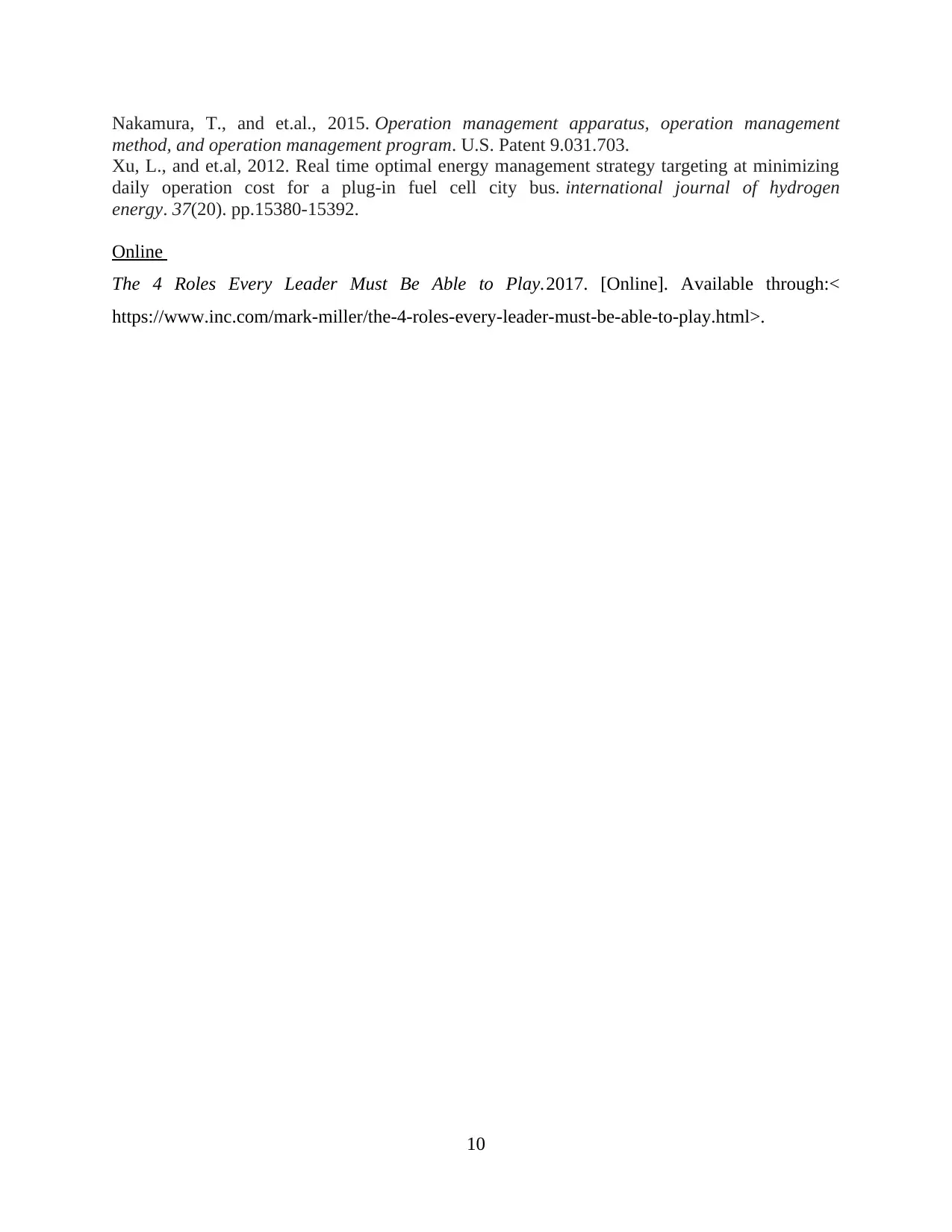
Nakamura, T., and et.al., 2015. Operation management apparatus, operation management
method, and operation management program. U.S. Patent 9.031.703.
Xu, L., and et.al, 2012. Real time optimal energy management strategy targeting at minimizing
daily operation cost for a plug-in fuel cell city bus. international journal of hydrogen
energy. 37(20). pp.15380-15392.
Online
The 4 Roles Every Leader Must Be Able to Play.2017. [Online]. Available through:<
https://www.inc.com/mark-miller/the-4-roles-every-leader-must-be-able-to-play.html>.
10
method, and operation management program. U.S. Patent 9.031.703.
Xu, L., and et.al, 2012. Real time optimal energy management strategy targeting at minimizing
daily operation cost for a plug-in fuel cell city bus. international journal of hydrogen
energy. 37(20). pp.15380-15392.
Online
The 4 Roles Every Leader Must Be Able to Play.2017. [Online]. Available through:<
https://www.inc.com/mark-miller/the-4-roles-every-leader-must-be-able-to-play.html>.
10
1 out of 10
Related Documents
Your All-in-One AI-Powered Toolkit for Academic Success.
+13062052269
info@desklib.com
Available 24*7 on WhatsApp / Email
![[object Object]](/_next/static/media/star-bottom.7253800d.svg)
Unlock your academic potential
Copyright © 2020–2026 A2Z Services. All Rights Reserved. Developed and managed by ZUCOL.





